Now we need some enterprising young students to do a positivism vs. hermeneutics battle.
Put down your New Yorker… here’s the bottom line!

Although:

It’s a bit hazy, but the yellow bar shows approval rates for the last six presidents among Whites. It suggests that Whites are being unduly hard on a president! The continuing significance of race indeed! Unless you really buy this socialist thing! It suggests that race and the economy have an interaction effect. When the economy is bad, race becomes salient and perhaps amplifies negative perceptions of the president among Whites, when things are good economically, race is less salient?
In the interest of ensuring our readers live longer, happier lives, I bring you perhaps my favorite TED talk (of which I have many). In this talk, Dan Beuttner gives us 9 factors that he and his research team argue will extend and improve our lives. The Presentation Zen blog give us a nice summary of his key points. I’m not up on my happiness research, so I’m not certain how empirically valid all these findings are or whether “happiness scholars” view this work as an advance, but it certainly did give me things to think about. As a political scientist and public policy scholar, I’m particularly interested in how these findings are converted into narratives that can yield better policy outcomes.
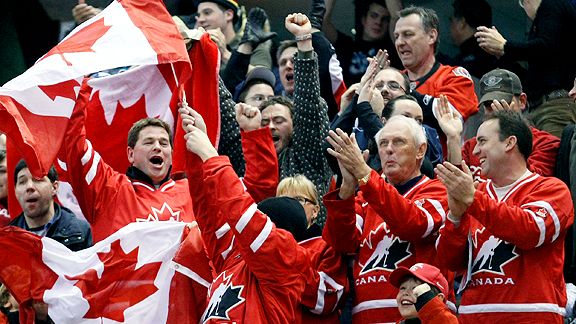
Notes from North of 49ºN
Charles McGrath in the NY Times wrote a curious and annoying piece on Canada’s quest for gold in the upcoming Winter Olympics in Vancouver {HT: LinnyQat}. I thought his characterization of Canada to be a collection of what I call “university-educated” stereotypes complete with quotes of Canadians, such as Margaret Atwood, that make the country sound like a nation of self-loating and self-deprecating sots. It’s articles like this that remind me that the New York Times often is a purveyor of moderately well-written naval gazing with all the right references to make it seem legit.
I’ve written blogs on Canada’s postcolonial experience, as well as how a trajectory of regionalism may be at play. Reading McGrath made me think about my own blogs. He thinks he’s stumbled on a new Canadian consciousness that cares about Olympic medals that’s out of place in the zeitgeist of the nation::
“They want to rewire the national mind-set and come away with not just a couple of golds but the most medals over all. They have dedicated roughly $118 million to enhancing the performance of Canadian athletes, and have financed something called the Top Secret project, in which teams of scientists have been studying the various winter sports in hope of gaining a technological edge.
The organization in charge of improving Canada’s medal performance has the un-Canadian-sounding name Own the Podium, and its chief executive, Roger Jackson, said: “We’ve never been pressured before to perform to a stated goal. Thirty medals or more is what we’re hoping for this time. I think we can get those.”
Talk like this, so nakedly ambitious, makes some Canadians uneasy. Theirs is a vast country that in many ways is run like a small town, with small-town values, and it has a highly developed culture of modesty, if not a collective inferiority complex. The athletic record in general is a little underwhelming, and some Canadians think that is because their countrymen prefer that, considering a good effort just as valuable as a trunkload of trophies, maybe better.”
McGrath is sounding like an American version of Andrew Cohen in The Unfinished Canadian. While I’ve argued that Canadian identity may be “fuzzy,” that has more to do with its sheer size, distinct regions, and relatively small population. Never underestimate the power of sports to galvanize a sense of identity, as evident in the recent film Invictus::
What McGrath fails to parse is the effects of capitalism and of culture. Hockey galvanizes Canada, solidifying an identity that may be fuzzy. It’s not that Canadians are OK with losing, as McGrath implies, it’s question of economics. It looks like Canada is willing to invest in its teams and I’ll bet a box of Timbits that if Canada wins medals, there won’t be a collective national sheepishness over the feat. Canadians don’t fear winning, it’s just that Canadian capitalism, to date, hasn’t fostered it. It looks like that’s changing.
The Canadian embracing of funding the medal count may not be without controversy. The Olympics have their detractors because of the astronomical costs involved. So, Canadians may like winning, there may not be a collective willingness to finance it at stratospheric levels.
Some may argue that if Canadians are so into hockey, why did they let the sport become Americanized and lose the Winnipeg Jets and Québec Nordiques in the process? It’s all about capitalism. I’ve blogged about the NHL on Rhizomicon and while the NHL has tried to expand heavily in the US to vie for the sports entertainment dollar, it’s the Canadian fans that are making the Canadian teams the top revenue generators.
Unfortunately, given scarcity of resources, the Canadian biatheletes are out in the cold, i.e., no corporate sponsorships. So, I’ll give them a shout out::

While Zina Kocher is a World Cup bronze medalist from the 2006-7 season, the funding just isn’t there for the biathlon.
Here’s a response to the NY Times pirce from the Toronto Star, which is pretty funny::
“We started talking about what we’re hoping for at the Olympics.
Ned said he hoped Canada would win so many fourths that they’d have to make a special new medal. Maybe a nickel medal. With a beaver on it. But not a cocky-looking beaver. Just a plain work-a-day beaver. We could hand them out after all the foreigners leave – so that no one feels left out.
I said I hoped we might sweep the fourths and fifths. And the odd sixth. But Ned shook his head at me, and I felt awful for a few minutes. And then ashamed of feeling awful.
But it was exciting to talk this way. Maybe the most exciting thing we’ve talked about since they (whimper) let Wayne drift away into that heaven-on-Earth they call California.”
Twitterversion:: NYTimes #fail confuses Canadian culture with capitalism re: Olympic medal push. Hilarious response in #Toronto Star. @Prof_K
Song:: The Besnard Lakes {Montréal, QC} -“Albatross”

Notes from North of 49ºN
This morning, the city of Toronto awoke to a mayoral candidate sex scandal that is likely to have zero effect on the outcome, given the strength of the frontrunner, George Smitherman. The Toronto Star had an article on how a woman came forward with text messages of a sexual nature and allegations that she had an affair with mayoral candidate Adam Giambrone, the Toronto Transit Commission chairman and City Councillor. Giambrone has a long-time girlfriend, Sarah McQuarrie. The article was full of lurid details, reminding me why I think of the Star as a bastion of hack journalism and often poorly-written articles. In the article, Adam called it a lapse in judgement and apologized to those close to him for the embarrassment his actions will cause them.
What I find interesting is not just how this story plays into the routine morality play of political sex scandals, but also how the press frames them. The above photo was in an article posted within the last 90 minutes on the Star, reporting that Giambrone is staying in the mayoral race. I found it interesting that the photo had images of “the couple” in clean-cut political mode, contrasted with “the other woman,” complete with low-cut blouse. Here’s the photo from the story that ran this morning, echoing more of the same::
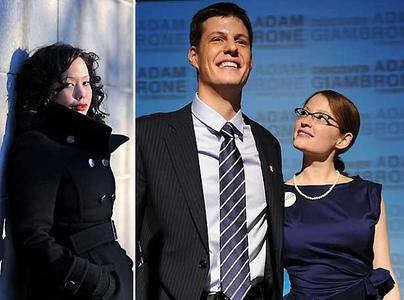
The Toronto Star might think I’m full of it {along with others}, but I think these photos are meant to reinforce, with a visual rhetoric, a specific normative political narrative with the intent of selling papers and fueling pageviews. WJT Mitchell wrote about “what do pictures want?” a few years back. These images attempt to simultaneously evoke an emotional response from us along with a judgment, as well as reinforce a narrative of our politicians.
The Torontoist had a good point by saying that this story is telling of our political culture. They also question the correlation between one’s private life and the ability to be a good public servant. I have no idea what the truth is in this story, but I have three points to make::
- If politicians are to be held to a high moral standard, why not all persons in positions of power? If a boss has an affair, should that be unequivocal grounds for termination?
- Doesn’t this scrutiny of politician’s private lives, given how technology is eroding privacy, set a precedent for all of our lives to be potentially in the public sphere?
- Doesn’t this scrutiny incentivize more bad behaviours, as in the case of John Edwards who not only had an affair, but went to great lengths to cover it up.
Does this preclude a mainstream politician who is a “player” or polyamorous? I think it does. And the Star will ensure we get out collective fill of any lurid details or allegations of “deviance” to express our collective outrage, just like in Victorian times, when “smut” was published as a cautionary warning—and make fistfuls of cash.
Update {10 February 2010, 8:39a EST}::
Giambrone admitted to more affairs and politicians are going on record expressing shock, dismay, and calling for his withdrawal from the mayoral race. It looks like the Toronto Star wasn’t the only one interested in sexy pictures. There was just differences on the definition of sexy. Here’s an excerpt from today’s Globe & Mail::
“At first, Ms. Lucas seemed eager for more exposure. She sent several photos of herself to a local gossip website yesterday morning because she disliked the portraits that appeared in the Star, according to David Robert, manager of drinktheglitter.com. “She wanted sexy pictures of her to be out there,” he said. “She’s like, ‘They’re going to get out anyways.’ “ But she shrank from attention as interest in the scandal swelled. Ms. Lucas swiftly deleted her Facebook and Twitter pages. Mr. Robert said she also disconnected her phone number and shut herself inside her house in East York to escape the media swarm.
“I think this is crazy for her,” he said. “But, my god, I mean, [yesterday] morning she sent Canada’s highest-rated gossip site 10 pictures of herself.”
Twitterversion:: Blog: Trending topic #Giambrone dustup in #Toronto. Star reciting familiar verbal/visual tropes to make $$. #ThickCulture @Prof_K
Song:: The Wedding Present-“Unfaithful”
Sarah Palin has gotten on Obama’s case for being a “charasmatic guy with a teleprompter”, but it looks like her hand was literally caught in the crib note cookie jar for the post-speech Q&A::
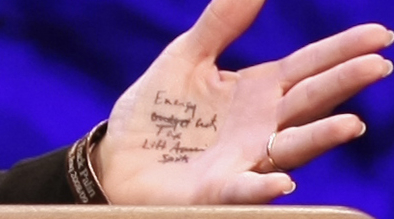
I think the only thing more embarrassing would if “left” or “L” were scrawled on it.
Here’s a short MSNBC {not Olberman} story on it::
and the full speech::
It’s interesting how social media enables the viral spread of stories like this. Is this unfair? Does this really matter? Why is this news? It reinforces what many think of her and there may be more than a little “trainwreck” effect, i.e., it’s gruesome, but one cannot help but slow down and gawk. Of course, the writing on the hand—it’s satire, people.
Twitterversion:: Pic of Sarah Palin’s “crib notes” for Tea Party speech Q&A {video of full speech avail.} spread virally via social media. #ThickCulture
Song:: David Bowie-“I Keep Forgettin'”

What follows is an excerpt from Frankfurt School theorist Walter Benjamin’s “On the Concept of History” {1940}::
My wing is ready to fly
I would rather turn back
For had I stayed mortal time
I would have had little luck.
– Gerhard Scholem, “Angelic Greetings”There is a painting by Klee called Angelus Novus. An angel is depicted there who looks as though he were about to distance himself from something which he is staring at. His eyes are opened wide, his mouth stands open and his wings are outstretched. The Angel of History must look just so. His face is turned towards the past. Where we see the appearance of a chain of events, he sees one single catastrophe, which unceasingly piles rubble on top of rubble and hurls it before his feet. He would like to pause for a moment so fair [verweilen: a reference to Goethe’s Faust], to awaken the dead and to piece together what has been smashed. But a storm is blowing from Paradise, it has caught itself up in his wings and is so strong that the Angel can no longer close them. The storm drives him irresistibly into the future, to which his back is turned, while the rubble-heap before him grows sky-high. That which we call progress, is this storm.
When I was in graduate school at UC-Irvine, I was in a doctoral seminar where we pondered these words. What did Benjamin really mean with his Angel of History? I struggled with it then and scholars have pondered Benjamin’s essays for decades.
I’ve been thinking of The Angel of History a lot these days, in terms of globalization, the financial meltdown, and the Big Recession. When Benjamin wrote this essay, he was thinking of the revolutions in France in of 1789, 1830 and 1848 and the Paris Commune of 1870. These “revolutions” are separated in time, but are part of a constellation. This is what the Angel sees when looking back at the rubble and the destruction of revolutions, but nothing can be done, as progress propels a trajectory. Benjamin’s view of the world was non-linear and dealt in gestalts.
In a global sense, I wonder if we are witnessing a shift. Progress and history are moving along a trajectory punctuated by discontinuities that affect the entire globe. These discontinuities aren’t isolated, but part of a constellation of ideas, concepts, events, actions, etc., such as::
- The fall of the Soviet empire
- The formation of the EU
- The rise of global financial flows
- The ubiquity of media
- The rise of fundamentalist Islam
- The rise of technologies and resultant efficiencies from IT and the web
- The rise of China
- The problem of intellectual property rights & their enforcement
- The rise of emerging technologies like biotechnology based on the genome
- The Big Recession of 2008-present*
What can be said of a constellation of the above? Are they isolated or interrelated? More importantly, how do these inform where we’re heading?
*Is this a discontinuity or a merely a part of ordinary business cycles?
Twitterversion:: Thoughts about Walter Benjamin’s Angel of History, as it pertains to the global economic meltdown. #ThickCulture http://url.ie/4yje @Prof_K
Song:: Young Galaxy-“Long Live the Fallen World”
Rockitbaby lets you compare online musical preferences between two cities. Hamburg and New York have a six percent overlap in music preference. By contrast, my current home (Los Angeles) and my birthplace (Miami) overlap at 49%. Not sure what that means, but it’s fun to play with.
I’m doing my civic duty as a political science geek and asking readers to consider signing a petition to encourage the President to have weekly Q&A sessions with the opposing party like the one he had with Republicans last week. I have some lenghty civic argument for why I believe this would be a good thing for American democracy, but because I’m between classes, I’ll use a less subtle appeal:
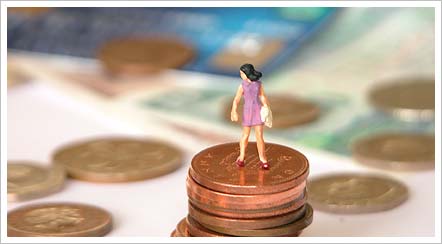
First off, I think there’s little that can be done about the forthcoming yearly deficits and total debt of the US federal government. Reigning in spending at this point will just make a bad situation worse. Nevertheless, what are the implications of the deficit. People have views about it, as Pew Research shows. It is currently #7, in terms of people’s top priorities and for the past two years, both Republicans and Democrats see it as a priority, being within a percentage point of each other. Over the years, the concern has gone up and down::
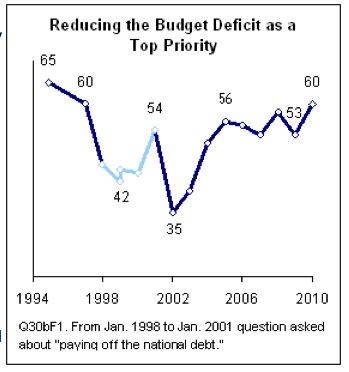 What I’m not sure is whether or not people get the implications of a huge debt. I remember in macroeconomics being taught about “crowding out”, where government spending and resultant borrowing “crowds out” entities seeking capital in lending markets and drives up interest rates. Now, the Wall Street Journal is singing cassandra’s tune, warning that foreign creditors holding US Treasury securities is a threat to the nation’s national security and Leon Panetta, CIA Director, agrees::
What I’m not sure is whether or not people get the implications of a huge debt. I remember in macroeconomics being taught about “crowding out”, where government spending and resultant borrowing “crowds out” entities seeking capital in lending markets and drives up interest rates. Now, the Wall Street Journal is singing cassandra’s tune, warning that foreign creditors holding US Treasury securities is a threat to the nation’s national security and Leon Panetta, CIA Director, agrees::
I don’t see this happening. Why? I think we’re in for the dollar depreciating, as I see policies on the horizon that will lead to inflation, higher interest rates, and a devalued dollar, as does Jim Jubak at MSN. Holding the dollar won’t have the appeal it once had, given that it’s likely to devalue, and the Chinese are already curbing their appetite for US debt. In any case, this level of debt isn’t a “game over” situation and the US won’t go bankrupt, no matter which “expert” says it on CNN.
Currently, inflation is practically non-existant, as is nominal GDP {i.e., national income} growth, and interest rates are rock bottom. The inflation and interest rates give the economy some degrees of freedom. A more troubling issue is GDP growth, which might be hindered by structural problems in the economy. We may not “grow” out of this, where economic growth increases incomes and tax revenues. Unemployment is the highest it’s been since 1983 and will be a political hot button issue in 2010.
As for deficit spending and the increasing debt, total public debt as a percentage of GDP {a debt to income ratio} is high, approaching the levels it was in the late 1940s. While the numbers are mind-boggling, the debt isn’t unprecedented.
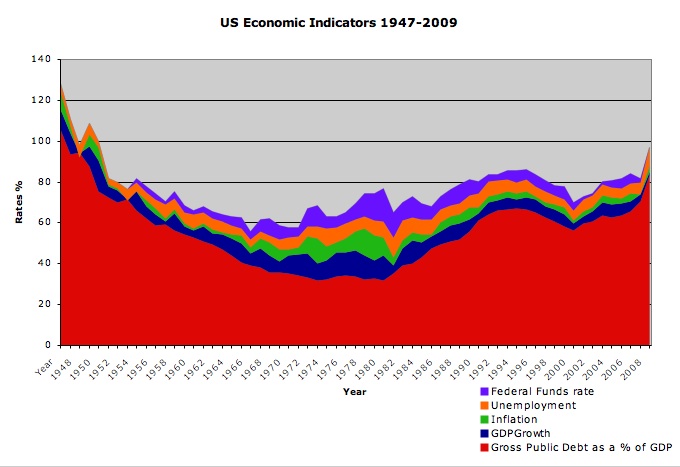
I’m not staying up at night worrying about the deficit, although there will be several policy implications::
- The true danger of the deficit spending is if there isn’t a multiplier effect, i.e., the impact of a dollar spent is some multiple of that dollar. I’m afraid that spending may not be directed towards projects/endeavours that get the most “bang” for their buck.
- Too much emphasis on the deficit may hamper spending that achieves multiplier effects.
- Read my lips, expect higher taxes in the long haul.
- There will political pressure to reduce unemployment and {in my opinion} spending should focus on this, in ways that achieve a multiplier effect, e.g., jobs that also increase innovativeness and/or productivity or improve infrastructure.
- Expect programme cuts and pressures towards privatization.
- Expect reductions in military spending.
Ideally, deficit spending is an “investment” in the country when there aren’t tax revenues to cover it, as in a recession. The real question shouldn’t be how much is being spent, but how and where it’s being spent.
Twitterversion:: Are you concerned about the US deficit? Blog post focusing on the real implications of running up the bills. @Prof_K
Song:: Hem-“When I Was Drinking”
“Living it up when the rent was due
With nothing and no one to live up to”
